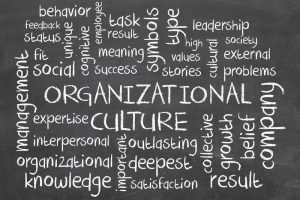BACKGROUND
Culture is one of those business terms that organizations talked about often – regardless of such factors as their:
- For-profit or not-for-profit status
- Size
- Industry
- Geographical location
- Degree of success
- Or any other factor
Yet exactly what is meant by the term is often unclear to employees – especially by those not part of the executive or management levels within the organization.
WHAT IS ORGANIZATIONAL CULTURE?
An organization’s culture is its shared values, norms and practices that serve to frame and model the interactions of people within it. Although it definitely includes written policies, it typically is seen and formed as much (or even more) by the unwritten rules about the behaviors and conduct expected to take place within the organization.
WHY IS CULTURE SO IMPORTANT?
Culture is widely acknowledged by leaders to have wide-ranging and deep impact on their organization’s success or failure. They know both intuitively and by measurable results that the RIGHT CULTURE has many positives. These include:
- Stimulates effective communications
- Supports teamwork and unity of purpose
- Synchronizes processes and inter-function actions
- Sparks increased productivity
- Supercharges creativity and innovation
- Strengthens employee empowerment and, in turn, engagement and satisfaction
- Stands out in seeking to attract and retain talent
- ➡ WHICH IS WHY IN CONDUCTING SEARCHES FOR CLIENTS, TRINITY ZEROES IN ON THE CULTURAL COMPATIBILITY OF POTENTIAL CLIENTS.
- Serves to achieve a better bottom line
SOME NOTEWORTHY FACTS ABOUT CULTURE
According to Gallup polling, employees who feel strongly connected to their organization’s culture are:
- More than three times as likely as their peers to be engaged at work
- More than five times as likely to recommend their organization to potential employees
- 55% less likely to be actively looking for another job
- 68% less likely to regularly feel burned out at work
Another study shows that 95% of candidates, culture is actually more important than compensation. Employees, and especially top performers, seek a sense of belonging — the confidence that they’ll find a personal sense of purpose in their job that aligns with corporate goals.
STAY TUNED FOR PART #2 ABOUT THIS IMPORTANT SUBJECT!
Author: Salvatore LoDico, SPHR
The HR Godfather TM
CEO, Trinity HR Consulting, Inc
Trinity HR provides retained searches and a full range of other HR management consulting services & solutions with clients throughout the U.S. Our clients:
- Range from large public corporations to start-ups & small family-owned businesses
- Include both for-profit and not-for-profit organizations.
To schedule a no cost, no obligation conversation about your needs & how our Team’s expertise can help you, email me at SalLoDico@TrinityHR.net or call me at 856.905.1762.
YOU HAVE HR CHALLENGES…TRINITY HAS SOLUTIONS!